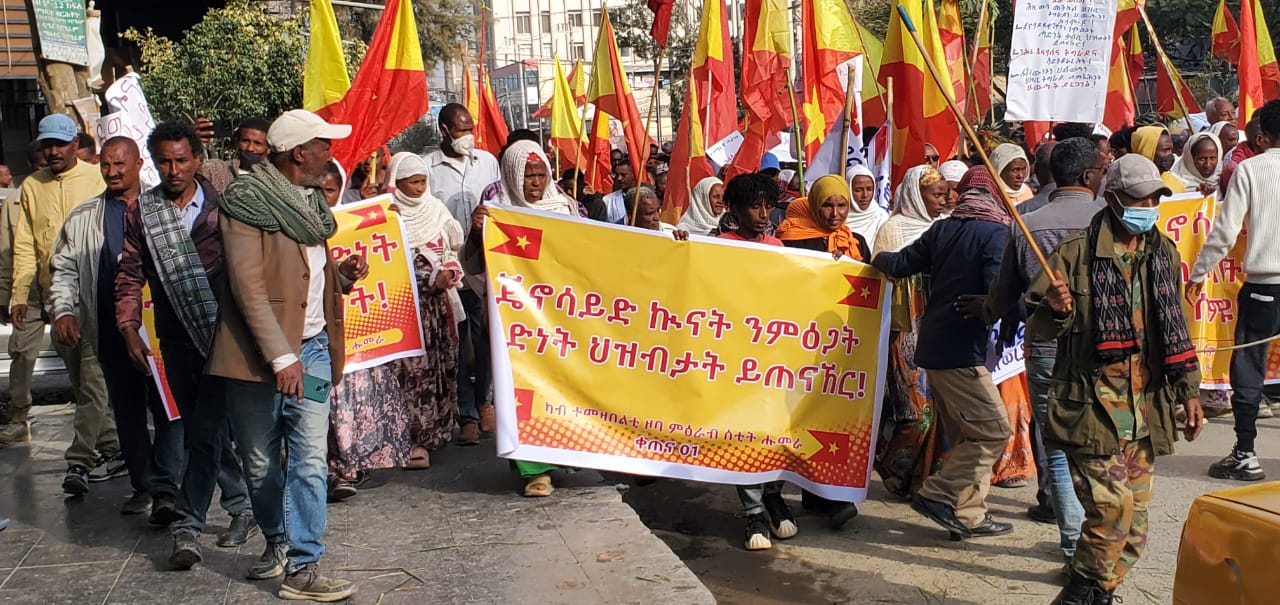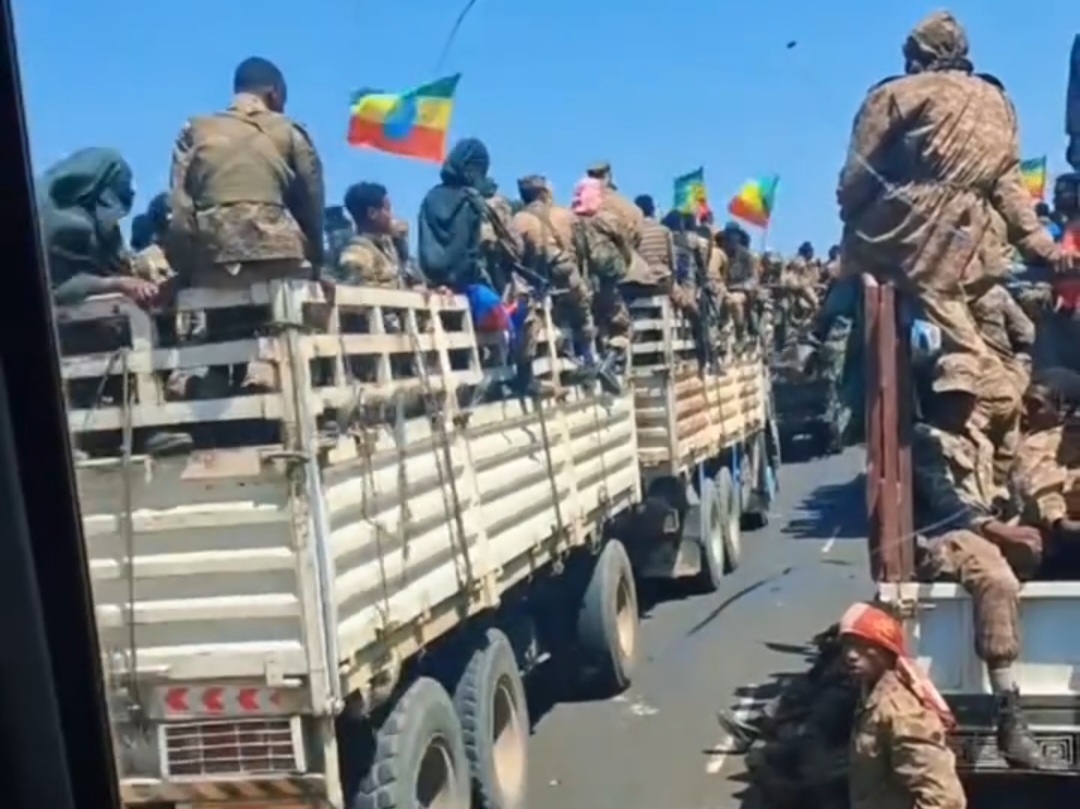BY TESFA-ALEM TEKLE
The Ethiopia’s government and the Tigray People’s Liberation Front (TPLF) signed a peace deal for the ‘permanent cessation of hostilities’ on 2 November, 2022.
The peace agreement reached in Pretoria has ended a two-year bloody conflict which claimed the lives of over 600,000 people and displaced millions more.
The durability of the deal is consequential for the country and most importantly for Tigray region, where the effects of the war and an unrelenting government blockade have pushed millions of people to the brink of starvation.
Alongside fuel shortages and severe water supplies, the region has also been largely disconnected from electricity, internet, and banking networks.
Despite the achievements gained to end the conflict, several emerging and developing issues remain to pose risks to a durable peace and security in the horn of Africa’s nation.
An ongoing conflict in Oromia region between government forces and Oromo Liberation Army (OLA), a rebel group fighting for independence of the Oromo people, Ethiopia’s largest ethnic group continue to fuel insecurity.
In addition, lack of effective implementation to Tigray peace agreement and religious crises also emerge to be other potential threats to the country’s peace.
“Armed conflict with OLA and dispute with Orthodox Church may have pressured the ruling Prosperity Party (PP) to remain intentionally silent about the implementation challenge of the Tigray peace agreement” Metta-Alem Sinishaw, a senior political analyst on Ethiopia and the Horn of Africa region told The East African Daily.
“PP abandoned its initial position of resolving the OLA conflict militarily and of the Orthodox Church dispute by imposing its will”
Facing mounting social resentments, PP has now called up on OLA, a designated terrorist entity by Addis, for negotiations.
Two weeks ago, the Ethiopian government called on OLA for reconciliation talks to end an armed conflict in the country’s Oromia region.
The offer comes as the Oromo rebels step up anti-government attacks in a bid to oust Prime Minister Abiy Ahmed’s government.
The rebel group shortly issued a statement saying that they would accept government’s call for peace “cautiously”
“A lasting and sustainable solution to Ethiopia’s complex political problems can only result from a comprehensive political process that culminates in negotiated settlements” part of the OLA statement shared to The East African Daily reads.
“Any call for resolution of the war on Oromia through civilized discourse is therefore a welcome news”
However, the group said the fresh calls lacks the requisite clarity and nuance to be too optimistic about the overtures of an imminent peace process in Oromia further recalling to the several formal and informal calls previously made by the Ethiopian government.
OLA said the fresh call was not new, both in form and substance.
“It did not add much to previous calls either. While details that might emerge in the days ahead are awaited, so far, the call is only a reiteration, at best” the group said.
According to Metta-Alem “incoherent ideology, internal squabble among PP members due to unclear strategy for ending the Tigray conflict and growing propensity of Oromo-PP towards hegemony are major detriment to durable peace and stability”
The Ethnolinguistic arrangement remains a fertile ground for the proliferation of vertical and horizontal conflicts, he said.
Tigray’s Concern
With regard to major concerns for TPLF especially on the issue of reconciliation and justice, the Ethiopian political analyst said “Both the federal government and the TPLF leadership seem disinterested in justice as both were accused of human rights violations by rights groups”
“As for reconciliation, most non-Tigrayans consider TPLF as ruthless tyrant with exploratory and supremacist tendency” Metta-Alem said.
“If TPLF remains a dominant power player contrary to the Pretoria peace accord, relations with the federal government and neighboring jurisdiction could be constrained”
“This could be more disadvantageous to Tigray, as it shatters the hope that the nascent Tigrayan political groups will introduce an alternative political discourse and mend relations that TPLF has antagonized” he added.
Political Settlement
The Pretoria peace deal has ended the human suffering in Tigray by paving the way for unfettered humanitarian assistance deliveries and a lift to a long imposed blockade on the region of estimated seven million population.
However, the political settlement of the conflict, according to the political analyst, still remains unclear given the emerging confrontation in the Horn by powers and regional actors in which “AU is only a platform with zero calorie for comprehensive continental policy”
“The political settlement of the conflict remains complicated by internal and external factors” he said adding “Externally, power completion in the horn region brought foreign meddling”
According to Metta-Alem, Eritrea’s strong bond with Russia and Abiy’s increasing proximity to the U.S. could turn former allies into pawn states.
“Internally, intra-prosperity party squabble and armed conflict together with macroeconomic pressure constrained the Prime Minister’s alternative on policy”
“Multilaterally, AU may have the will, but unlikely to have enforcement capability of policies of regional or continental significance”
“It allegedly continues to be a platform to implement the desires of its technical and financial enablers, although it takes anecdotal positions in certain conditions” he added.
Food Insecurity & Abiy’s Over Ambition
Furthermore, inflation, ever increasing hike on food prices, rising food insecurity coupled with high levels of internal displacement over ethnic clashes further pose risks to social stability.
Prices of imported items including on fuel and food items has sharply risen following Russia’s war on Ukraine adding pressure to supply chains.
Last December, a UN ship delivered Ukrainian wheat destined for Ethiopia, the first vessel to sail as part of a push to send food to countries most vulnerable to famine and drought.
The aid delivery was part of Ukraine and allied nations initiative to export $150 million worth of wheat grain to Ethiopia, Sudan, South Sudan, Somalia, Congo, Kenya, and Yemen.
Yet, the Ethiopian Prime Minister Abiy Ahmed during last month’s Africa Union (AU) summit held in Addis Ababa, proudly spoke about his country’s over ambition to become a global food supplying nation through wheat grain exports.
In this regard, Abiy mentioned how Ethiopia is aggressively working to enhance agricultural productivity during the past four years.
“We have begun an initiative that encourages small-holder farmers to farm in clusters that enable them to benefit from irrigation and mechanization” Abiy said.
“Our latest focus on wheat productivity is bearing fruit. And our ambition to start exporting wheat this year has already materialized. A great achievement for Ethiopia. An even greater achievement for our continent” he said.
“Not only will Ethiopia feed itself; we are confident that we can strongly contribute to global food supplies through exports and otherwise” Abiy added.
Way Forward
According to political analysts, Ethno nationalism continues to be the modus operandi for power and other resources’ allocation.
“In as much as Ethnonationalism serves as the most effective tool for social mobilization, it is a potent force posing a serious challenge for social stability and national survival” Metta-Alem said.
“Until an alternate political dispensation with clear national integration policy is reformed, Ethiopia will remain engulfed in perpetual instability due to contradictory ethnic interests” he added.
(The East African Daily)



